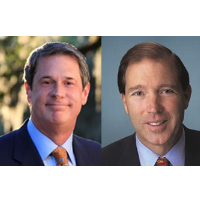Clashing Chemical Safety Bills: Industry vs. Consumers
 Sen. David Vitter and Sen. Tom Udall
Sen. David Vitter and Sen. Tom Udall
The U.S. Senate shortly faces a choice between two views of chemical regulation—one backed by industry, the other with stronger consumer protections.
The first, with heavy support from the chemical industry, got its first hearing Wednesday before the Senate Environment and Public Works Committee. The Frank R. Lautenberg Chemical Safety for the 21st Century Act, co-sponsored by Sen. David Vitter (R-Louisiana) and Sen. Tom Udall (D-New Mexico), is touted as a “common-sense” update to the current regulatory legislation. However, the Environmental Working Group (EWG) called the proposal “actually worse than the existing Toxic Substances Control Act.” The organization cites the failure to specifically address asbestos, deadlines for chemical review pushed far into the future, not allowing states to set tougher standards for chemical safety, and several other issues. In addition EWG says the bill would actually weaken the Environmental Protection Agency’s ability to intercept imported unsafe chemicals.
The chemical industry has made sure those who co-sponsored the Lautenberg bill are well taken care of financially. Vitter received $14,000 from the industry in the 2014 election cycle, topping off the nearly $60,000 the industry has handed him during the past six years. He also received a $150,000 donation from the American Chemistry Council to the super PAC supporting his Louisiana gubernatorial bid, according to Maplight. The industry donated $15,000 to Udall during the 2014 cycle and sponsored a television commercial in support of his leadership.
Additionally, during that same election cycle, all 17 senators who sponsored or co-sponsored the Vitter-Udall bill were among the current members of the Senate who received more than $1 million in donations from the nation’s top 10 chemical companies. The total amount spent by those organizations on lobbying during that period was more than $76 million, Maplight reported. The industry’s spending on lobbying immediately after the legislation was introduced hit a record high for those companies. More than $4 million was spent by the Chemistry Council alone to pay for TV and radio ads supporting the campaigns of those in Congress who backed the bill.
“I’ve been around the Senate for a long time, but I have never before seen so much heavy-handed, big-spending lobbying on any issue,” Sen. Barbara Boxer (D-California) told The New York Times. “To me it looks like the chemical industry itself is writing this bill.”
Boxer even tracked the bill’s origins to the industry’s lobbying arm. “Maybe I’m old fashioned, but I do not believe that a regulated industry should be so intimately involved in writing a bill that regulates them,” she added.
In response to what she viewed as deficiencies in the Lautenberg bill, Boxer and Sen. Ed Markey (D-Massachusetts) have introduced the Alan Reinstein and Trevor Schaefer Toxic Chemical Protection Act. That legislation, named for two victims of chemical pollution, would go much farther in protecting Americans from chemical dangers. It would require faster review of chemicals, specifically address the threat from asbestos, allow states to impose more restrictions and enforce a stricter standard of what is hazardous.
“This legislation will preserve vital protections like a state’s ability to clamp down on dangerous chemicals, while ensuring that known chemical threats to public health are acted on quickly,” Markey said in a statement. “This bill will help ensure that communities are protected from chemical spills and clusters of disease that are related to toxic exposures.”
There’s currently no timetable for the Senate Environment and Public Works Committee, run by Sen. James Inhofe (R-Oklahoma), to take up Boxer and Markey’s bill.
-Steve Straehley
To Learn More:
Boxer: Chemical Bill Came From Industry (by Lydia Wheeler, The Hill)
Industry Chemical Bill Worse Than Current Law (by Scott Faber, Environmental Working Group)
Hearing Notification (Senate Environment and Public Works Committee)
Chemical Industry Increases Contributions and Lobbying as Congress Takes up Chemical Bill (by Daniel Stevens, Maplight)
Senators Boxer and Markey Introduce TSCA Reform Bill to Protect the Health of Children and Communities (Senate Environment and Public Works Committee)
Tom Udall’s Unlikely Alliance With the Chemical Industry (by Eric Lipton, New York Times)
- Top Stories
- Unusual News
- Where is the Money Going?
- Controversies
- U.S. and the World
- Appointments and Resignations
- Latest News
- Trump Renames National Football League National Trump League
- Trump to Stop Deportations If…
- Trump Denounces World Series
- What If China Invaded the United States?
- Donald Trump Has a Mental Health Problem and It Has a Name






Comments